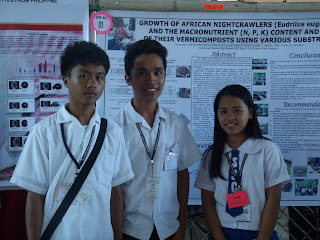By Niño S. Manaog
With reports from Bernie Protacio and Teresa Badilla
In October 2011, the Farmers’ Information and Technology Services (FITS) Center based in Dumalag, Capiz played host to two sets of visitors of their Techno Pinoy Center and their engineered bamboo technology.
On October 17, 2011, Capiz State University (CapSU) Techno Gabay Coordinator Eduardo Navarra joined Eduardo Macose of the Aurora State College of Technology based in Baler, Aurora province to visit the Dumalag FITS Center in Poblacion, Dumalag, Capiz. In behalf of his college, Prof. Macose, who is agriculture specialist, expressed interest in studying the engineered bamboo technology of Randy Fancubila, the FITS Center’s Magsasaka Siyentista (MS).
Sometime in July this year, Macose read about the write-up on MS Randy Fancubila of Dumalag FITS Center and his engineered bamboo technology on thecapsumonitor.blogspot.com, CapSU’s blogsite. He then sent a letter to CapSU addressed to Dr. Magallanes expressing interest to visit the Dumalag FITS Center.
As per the advice of Dr. Magallanes, Dr. Cora Navarra, external affairs and linkages director, contacted Macose on details coordinating his visit. Though it took a while for Macose to eventually conduct the visit (the visit took place some two months after the inquiry), he expressed gratitude for the successful coordination work done by CapSU.
Macose first visited Fancubila’s bamboo workshop in barangay Sta. Cruz of the same municipality and threw a number of queries with the e-bamboo practitioner. Macose noted that he was impressed by the ingenuity of Fancubila’s bamboo crafts and products including the engineered bamboo tiles and tables and also recognized the need for more processing machinery so as to attain productivity. After the visit, Macose is prepared to make suggestions for his school on how they can start and pursue efforts for their own bamboo technology in the province of Aurora.
On October 20, 2011, ten faculty members and researchers from the Sultan Kudarat State University (SKSU) based in Tacurong City, Sultan Kudarat flocked to the Dumalag FITS Center. The contingent composed of Alexes Gallo and Rhodora Gallo, Gregorio Ilao, Benedict Rabut, Fely Dacayo, Rosemary Talingo, Edwin Alido, Roselyn Floresca and M. Salomon, is a member of the Cotabato Agricultural Research and Resources Development Consortium (CARRDEC), one of PCARRD’s 14 consortia nationwide.
After the Dumalag FITS Center led by Manager Ronelyn de Tomas and assisted by Bernie Protacio and Teresa Badilla, agricultural technologists, briefed the Mindanao visitors on their services, they screened a video-presentation detailing their agricultural and technological interventions for the clientele farmers. MS Randy Fancubila toured the delegates in Sta. Cruz, Dumalag, Capiz at his bamboo processing center funded by PCARRD.
The SKSU delegation was purposely sent by Dr. Ruby Hechanova, SKSU’s director for research and development, to “benchmark as well as learn the best practices from our counterparts in this part of the region.”
The Dumalag FITS Center particularly highlighted their efforts on engineered bamboo technology featuring the innovation and organization of MS Randy Fancubila and his bamboocraft producers’ cooperative composed of some 27 active members across the municipality.






